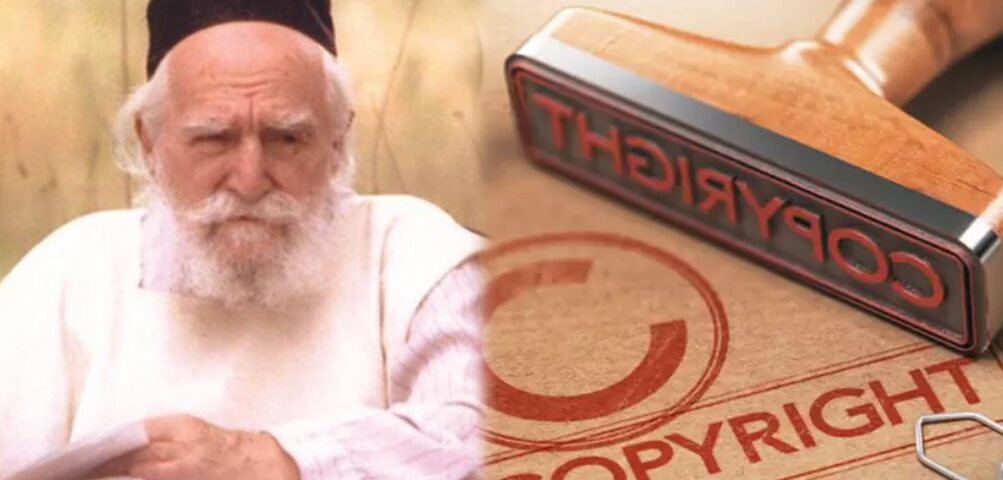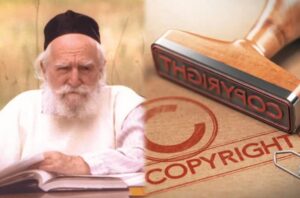Unpacking the Iggerot: Intellectual Property and Copyrights

 Read more about “Unpacking the Iggerot” and see the archive of all past columns.
Read more about “Unpacking the Iggerot” and see the archive of all past columns.
Intellectual Property and Copyrights / Iggerot Moshe, O.H., vol. 4, #40:19
Summarizing the Iggerot
R. Feinstein was asked about the halakhic and ethical propriety of copyrights on recorded Torah lectures. He posits that a Torah lecturer possesses the right to forbid another party from taking his tape and making copies of it, as the lecturer is the owner of the original copy. Moreover, since the lecturer potentially stands to profit off of its sales, withholding another party from reproducing it would not constitute middat Sedom, the traits of the Sodomites who refused to share with others even in the absence of any loss on their own part.
However, what if instead of making a copy of the lecturer’s tape an attendee simply recorded it on his own personal device and subsequently distributed it to others? If the lecturer expressed opposition to this then, while it would not be classified as theft since no physical object was seized from another party, it would still constitute an ethical violation, as anyone who attended the presentation would have implicitly accepted his pre-conditions on what they may or may not do with his intellectual property.
While the topic of intellectual property generally centers on the strictures and regulations on the consumer, R. Feinstein notably analyzes this scenario from the standpoint of the producer as well. One could suggest that the lecturer is bound by a religious obligation to proliferate Torah knowledge and should possess no right to prevent others from disseminating “his” ideas. While that may be true, R. Feinstein points out that there are legitimate reasons why he may wish to conceal his ideas from a broader audience. There are many instances in the Talmud in which we are told that something is “a halakha but we do not instruct it” to the masses, to prevent misinterpretation and misapplication of the principle. Also, it is possible that while the lecturer might feel comfortable piloting his novel ideas to a select group of individuals, he may feel the need to further refine and revise his content later on, which would be challenging to do once the original material has already been shared far and wide.
Even with these concerns in mind, R. Feinstein concludes that students should certainly be permitted to record a lecture so they can personally study and review it. And, indeed, the teacher is generally expected to allow this, as it aids the learning process.
Connecting the Iggerot
The final point above is consonant with what R. Aharon Felder records in his notes on R. Feinstein’s own classes regarding copyrights for a book, ruling that that “one who purchases a volume may make a photo-copy of the pages for personal use” (Reshumei Aharon, vol. 2, p. 3).
Similarly, R. Feinstein once received a request from an Israeli company to republish and disseminate his responsum that was supportive of taking out insurance policies (see Iggerot Moshe, O.H., vol. 2, #111). Upon reading this, he expressed that he was uncertain he even had the right to prevent them from doing so should he wish. After all, he had published it in a book stating that it is within the public domain for anyone to quote (Mesoret Moshe, vol. 3, p. 350; cf. Reshumei Aharon, vol. 1. p. 91).
R. Feinstein maintained that once someone shares a Torah idea it effectively enters the public domain and can be disseminated to other parties. He expressed, however, that perhaps there is a form of ownership that can be attributed to the consolidation and choice of words used to convey those concepts. Both R. Dovid Feinstein and R. Reuven Feinstein appeared to have adopted the same degree of flexibility by authorizing R. Avraham Fishelis to publish his adaptation of their father’s Shabbat and Holiday discourses in Kol Ram. Though, consistent with his written responsum, R. Feinstein maintained that one should seek permission from a lecturer before disseminating their classes more widely due to the concerns we mentioned earlier (see Mesoret Moshe, vol. 3, p. 350).
Reception of the Iggerot
While I have not identified significant pushback to R. Feinstein’s approach on intellectual property, my colleague R. Aharon Beuchler pointed me to a comprehensive work on this topic called Sefer Zekhuyot ha-Yotzrim by R. Avraham Levi, who cites the Iggerot Moshe as normative halakha (see pp. 64-66 and footnotes, ad loc.). This volume contains a section of responsa – one of which works off of R. Feinstein’s responsum and Mishpatei Shmuel (#35) to assert that ownership of notes from a lecturer’s class belongs to the note-taker, not the presenter (Responsa Or ha-Yetzira, #20, excerpted in Sefer Zekhuyot ha-Yotzrim, pp. 169-170). While this is indeed consistent with R. Feinstein’s position, we should note that he would still insist that the note-taker receive consent from the lecturer prior to proceeding to spread his ideas to a general audience.
Reflecting on the Iggerot
The question of intellectual property has been on my mind over the course of my research into R. Feinstein and the Iggerot Moshe. Unlike in Unpacking the Iggerot, my upcoming Hebrew anthology of R. Feinstein’s ideas on Pirkei Avot quotes a significant amount text in its original formulation. As I felt some discomfort with this, I was then grateful that none other than R. Reuven Feinstein, the last living son of R. Moshe Feinstein, concurred with my methodology. Here is my translation of his approbation to the volume which sheds significant light on our topic:
5 Nissan 5785
To the honorable of R. Moshe Kurtz,
I was delighted to receive pages from your book on Pirkei Avot. It is the fruit of your labor that you exerted to collect and gather from the Torah of my father and teacher zt”l from many books – whether they be from his own holy hand or from the many other works that present his Torah and works and the good deeds of his life that have a connection to Pirkei Avot.
And certainly this is a good idea to publicize the Torah of my father and teacher zt”l to the generation in a new manner so that they will learn from his Torah and deeds. But it is self-understood that there is a great danger. Firstly, where one quotes only an excerpt from a larger piece it is possible that the reader will not fully grasp his intent unless he looks at the original style of the wording. Moreover, when they are already in a tertiary vessel – even though we are not concerned an author would deliberately lie, challenging circumstances have already established that there are oftentimes variance whether in the deeds or the halakha [being conveyed] to the point that there are “new faces” that have come here [i.e., new interpretations of potentially dubious worth are presented as if they are original to R. Feinstein’s own teaching].. And it is difficult to rely on words that are only hearsay without knowing who the listener was and to whom the matter was conveyed.
But from the little I have analyzed, I was pleased to see that which you cite whether from the works of my father and teacher zt”l or from other books, you were punctilious to quote them word for word with no variation in language. And you provided a citation indicating where every excerpt came from. And you have invested much effort and talent in publishing this splendid and well-presented volume. It is for the reader to take care to be punctilious and to analyze the sources and books that you cited.
Therefore, I come to bless you to see much success from this book and from all the deeds of your hand. And may it be His will that in the honor of you disseminating the Torah of my father and teacher zt”l that you will merit to continue in your holy work with a tranquil spirit, health, abundant finances, and much pride from your family together with your prestigious wife until the swift arrival of the Redeemer.
[R.] Shalom Reuven Feinstein
Indeed, I was reassured to see that he concurred that not only was it permissible to excerpt directly from R. Moshe Feinstein’s work, but that there is even an imperative to preserve the original language as it does a service to the originator of the intellectual property by conveying their content in the most accurate manner possible. And certainly, this is in keeping with the Talmudic teaching: “And Rabbi Elazar said that Rabbi Hanina said: Whoever reports a saying in the name of he who said it brings redemption to the world. As it is stated: ‘And Esther reported it to the king in the name of Mordecai’ (Esther 2:22)” (Megilla 15a).
Endnote: See also Meged Givot Olam (vol. 3, p. 117), in which R. Michael Shurkin reports that there was an incident in which someone snapped a photo of another individual without permission “and I heard that the great R. Moshe Feinstein zt”l said that [the individual in the photo] has no ownership on it and has no standing to sue him. And this is a novel idea (ve-hiddush hu).”
Moshe Kurtz is the rabbi of Cong. Sons of Israel in Allentown, PA, the author of Challenging Assumptions, and hosts the Shu”T First, Ask Questions Later
